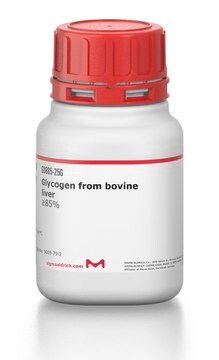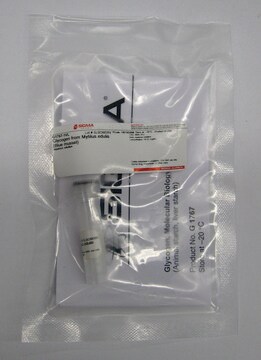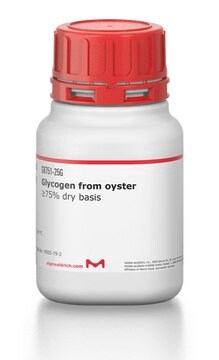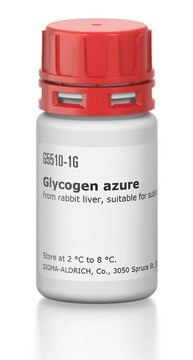Wszystkie zdjęcia(1)
Kluczowe dokumenty
10901393001
Roche
Glikogen
from mussels
Synonim(y):
glikogen
Zaloguj sięWyświetlanie cen organizacyjnych i kontraktowych
About This Item
Kod UNSPSC:
41116100
Polecane produkty
Poziom jakości
Formularz
solution
opakowanie
pkg of 1 mL (20 mg)
producent / nazwa handlowa
Roche
temp. przechowywania
−20°C
Powiązane kategorie
Zastosowanie
This preparation is used as a carrier for the precipitation of nucleic acids (DNA or RNA). As an inert material it may replace tRNAs or sonicated DNAs.
20 μg glycogen (1 μl solution) allow to precipitate pg-amounts of DNA or RNA from a volume of 1 ml.
In a typical experiment 5 pg [3H]-labeled calf thymus DNA were dissolved in 500 μl 10 mM Tris-HCl, pH 8.0; 1 mM EDTA; 0.4 M LiCl. 1μl glycogen solution (20 μg glycogen) as carrier was added and then precipitated with 1.2 ml ethanol at -15 to -25 °C and stored for 3 hours at -15 to -25 °C. After centrifugation (10 minutes at 12 000 × g) the total radioactivity was found in the precipitate. Without addition of glycogen no precipitation of DNA occured.
20 μg glycogen (1 μl solution) allow to precipitate pg-amounts of DNA or RNA from a volume of 1 ml.
In a typical experiment 5 pg [3H]-labeled calf thymus DNA were dissolved in 500 μl 10 mM Tris-HCl, pH 8.0; 1 mM EDTA; 0.4 M LiCl. 1μl glycogen solution (20 μg glycogen) as carrier was added and then precipitated with 1.2 ml ethanol at -15 to -25 °C and stored for 3 hours at -15 to -25 °C. After centrifugation (10 minutes at 12 000 × g) the total radioactivity was found in the precipitate. Without addition of glycogen no precipitation of DNA occured.
Cechy i korzyści
Glycogen, in special quality for molecular biology, is an inert carrier in nucleic acid preparations.
Contents
Aqueous solution, 20 mg/ml
Contents
Aqueous solution, 20 mg/ml
Komentarz do analizy
Testowane pod kątem braku endonukleaz, aktywności nicowania, egzonukleaz, RNaz, kwasów nukleinowych i proteaz zgodnie z aktualnymi procedurami kontroli jakości.
Inne uwagi
For life science research only. Not for use in diagnostic procedures.
Ta strona może zawierać tekst przetłumaczony maszynowo.
najczęściej kupowane z tym produktem
Kod klasy składowania
12 - Non Combustible Liquids
Klasa zagrożenia wodnego (WGK)
nwg
Temperatura zapłonu (°F)
does not flash
Temperatura zapłonu (°C)
does not flash
Wybierz jedną z najnowszych wersji:
Masz już ten produkt?
Dokumenty związane z niedawno zakupionymi produktami zostały zamieszczone w Bibliotece dokumentów.
Klienci oglądali również te produkty
Ming Wang et al.
Aging cell, 19(6), e13147-e13147 (2020-05-01)
Progerin accumulation disrupts nuclear lamina integrity and causes nuclear structure abnormalities, leading to premature aging, that is, Hutchinson-Gilford progeria syndrome (HGPS). The roles of nuclear subcompartments, such as PML nuclear bodies (PML NBs), in HGPS pathogenesis, are unclear. Here, we
Masaoki Ito et al.
JTO clinical and research reports, 1(4), 100084-100084 (2020-08-21)
EGFR mutation-positive lung adenocarcinoma (LUAD) displays impaired phosphorylation of ERK and Src-homology 2 domain-containing phosphatase 2 (SHP2) in comparison with EGFR wild-type LUADs. We hypothesize that SHP2 expression could be predictive in patients positive with resected EGFR mutation versus patients
Hanwen Gu et al.
Poultry science, 100(9), 101321-101321 (2021-07-24)
Deep sequencing of RNAs has greatly aided the study of the transcriptome, enabling comprehensive gene expression profiling and the identification of novel transcripts. While messenger RNAs (mRNAs) are of the greatest interest in gene expression studies as they encode for
Gabriele Girelli et al.
Nature biotechnology, 38(10), 1184-1193 (2020-05-27)
With the exception of lamina-associated domains, the radial organization of chromatin in mammalian cells remains largely unexplored. Here we describe genomic loci positioning by sequencing (GPSeq), a genome-wide method for inferring distances to the nuclear lamina all along the nuclear
Xiwen Cheng et al.
The Journal of biological chemistry, 288(41), 29746-29759 (2013-08-30)
The promyelocytic leukemia protein is a well known tumor suppressor, but its role in metabolism is largely unknown. Mice with a deletion in the gene for PML (KO mice) exhibit altered gene expression in liver, adipose tissue, and skeletal muscle
Nasz zespół naukowców ma doświadczenie we wszystkich obszarach badań, w tym w naukach przyrodniczych, materiałoznawstwie, syntezie chemicznej, chromatografii, analityce i wielu innych dziedzinach.
Skontaktuj się z zespołem ds. pomocy technicznej












